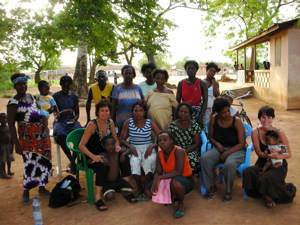
I hear Bob Marley beckoning me: “Rise up this morning. Smile at the rising sun.” Rhythmic reggae vibrates in my head, waking me up. My hand parts the seashell curtain-door. Inside, red, yellow, and green stripes of the Ghanaian flag decorate every wall. I glance down at my cell phone, as I belly up to the bar. It is 10 am.
Every Monday morning at Point Five Bar, 28 members of the Dwen Hwe Kan Group meet to repay loans, discuss business, and socialize. In the Fante language, Dwen Hwe Kan means, “With every step you take, consider the future.” The dynamic support system of group lending encourages each member to patronize fellow member’s businesses. Point Five Bar is owned by Amelia Avokliya, a member of the group. I am here to interview Amelia and the other entrepreneurs. This is the only reason I am at a bar at 10 am, I promise.
I sit down with Ema Saa Imoro. Naturally, Ema is somewhat timid of the obroni sitting in front of her. Obroni is a completely friendly term for outsider, or white girl in my case. I try to break the ice with a rather sad attempt to speak Twi. I’ve mastered, “How are you?” and “I love you” and “Where is the bathroom?” Most Ghanaians are quite amused when I string all three phrases together. “Wo wo te sen? Me do wo. Me pese mi ko jun so?” Ema chucked to her sister sitting next to us, “Silly Obroni.”
An hour into my conversation with Ema, I am dizzy with humility. Ema is a widow and the proud mother of four daughters who all live with her. Ten years ago, Ema’s mother died and she dutifully raises her four younger siblings who also live with her. It took me a minute to fully absorb this noble feat. But wait, that’s not all. Ema also cares for her 80 year old father. Every day at 3 am, Ema begins cooking the wakye she sells in the village of Effiakuma. I picture her waking up in the morning–eternally tired yet infectiously happy, quietly strong yet magnetically warm, perpetually giving yet unaware of her own selflessness. I backtrack a step to verify what I was hearing. “Ema, you take care of nine people?” Ema didn’t even bat an eyelash; “These people are my own, so I always find a way.” Sadly, our time together came to an end.
Next in line to talk to is Kiva client Ramatu Kadre. Ramatu sells cosmetics and hair supplies. Ramatu is the proud mother of seven children who all live with her. Ramatu’s husband works in the port of Takoradi, but sadly he has been out of work for one year after a heavy container fell on his arm, leaving it severely broken. Ramatu is the sole breadwinner, yet she somehow manages to also care for her sister’s 18 year old and her 25 year old daughter’s five month old baby. Like Ema, Ramatu financially supports nine people.
At times, people become desensitized by all the sadness, war, crime, and injustice in the world. As a Kiva Fellow in Ghana, I hope to never become desensitized by all soul-baring determination I witness with each Kiva client I meet.















